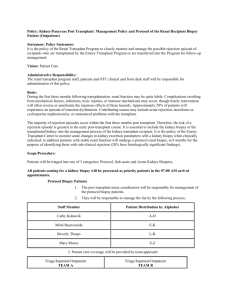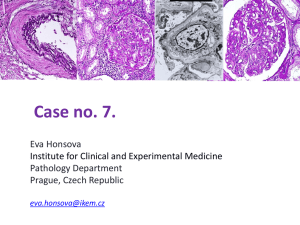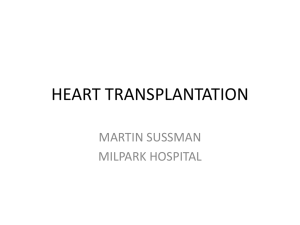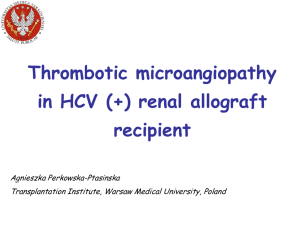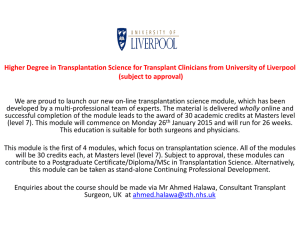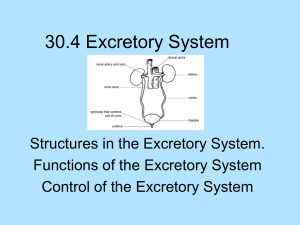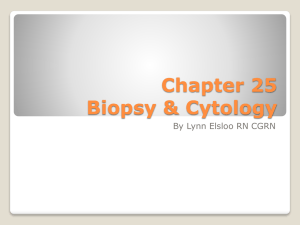Protein casts, nodular glomerulosclerosis in graft biopsy
advertisement
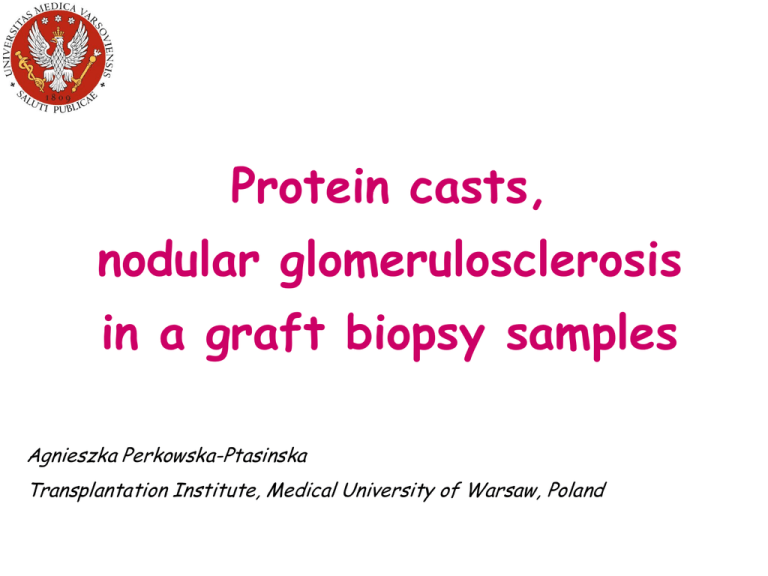
Protein casts, nodular glomerulosclerosis in a graft biopsy samples Agnieszka Perkowska-Ptasinska Transplantation Institute, Medical University of Warsaw, Poland Case 1 • 55 years old male with end-stage native kidneys insufficiency of unknown reason, • renal transplant from 3 HLA mismatched, cadaveric, 57 years old female donor, • the donor and recipient: HIV (-), HCV (-), HBV (-), • at the time of Tx: mild anemia, • the initial immunosuppression: cyclosporine, mycophenolan-mofetil and prednisone in typical doses. Case 1 • Three weeks after transplantation the patient was still oliguric, and dialysis-dependant, • the urine protein content was 25 mg/dl, • on the day 21 the graft biopsy was performed. Case 1 – graft biopsy Case 1 – graft biopsy Case 1 – graft biopsy Case 1 – graft biopsy Light chain kappa Light chain lambda Case 1 •The initial diagnosis: cast nephropathy due to light chain gammapathy accompanied by mild thrombotic microangiopathy, •trepanobiopsy, blood, and urine immunofixation tests: findings consistent with the diagnosis of myeloma multiplex IIB. •INR, APTT, LDH, bilirubin concentration - within normal limits, •Pt received chemioterapy, but the graft function remained very poor. Acute thrombotic microangiopathy Procoagulant factors myloma-related: - an impaired fibrinolysis (mostly secondary to increased PAI-1 activity), - the influence of monoclonal proteins with fibrin structure, - a procoagulant antibody production, - the impact of the inflammatory cytokines on the endothelium. Transplantation-related : - rejection - acute CNI toxicity Case 1 6 weeks after transplantation patient was still dialysis-dependant, on the 51 post transplant day the graft was removed due to it’s constant dysfunction. Protein casts in kidney transplant Recipients treated with rapamycin: quite common DGF due to acute tubular injury associated with casts indistinguishable from myeloma casts. Casts composition: •Smith et al.: degenerating renal tubular epithelial cells (JASN 14: 1037–1045, 2003) •Pelletier et al.: myoglobin (Transplantation 2006 15;82(5):645-50) Case 2 Male, born in 1953 medical problems: • diabetes type 2, insulinotherapy (retinopathy? no data) • monoclonal gammapathy (no detailed information, patient received chemiotherapy with leukeran, azatiophryne and prednisone) 2007: proteinuria 9g/d, crea: 2,7mg/dl native kidney biopsy Case 2 – native kidney biopsy Case 2 – native kidney biopsy IFL: negative for Ig, C3, C1q and light chains Case 2 – native kidney biopsy Case 2 – native kidney biopsy Morphological picture: nodular glomerulosclerosis severe arteriolar hyalinistaion interstitial fibrosis and tubular atrophy Diagnosis: Diabetic nephropathy LCDD? Case 2 2010: •Serum free light chains ratio within normal limits •preemptive kidney transplantation, kidney graft received from patient’s younger brother (no HLA match) the donor and recipient: HIV (-), HCV (-), HBV (-), the initial immunosuppression: tacrolimus, mycophenolan-mofetil and prednisone in typical doses. the lowest serum crea conc. 1,2 mg/dl Case 2 July 2012: serum crea conc. 1,6 mg/dl proteinuria: 100 mg/dl Serum FLC: marked excess of kappa LC Kidney transplant biopsy Case 2 – transplant kidney biopsy Case 2 – transplant kidney biopsy Case 2 – transplant kidney biopsy IFL: kappa light chain C4d Case 2 – transplant kidney biopsy Case 2 – transplant kidney biopsy Morphological picture: nodular glomerulosclerosis interstitial fibrosis and tubular atrophy Diagnosis: LCDD Plasma cell dyscrasias A spectrum of diseases that include: • MGUS (monoclonal gammapathy of uncertain significance) (2% - 4% of all individuals > 50 years) • multiple myeloma (MM) (10% of all hematologic malignancies) • solitary plasmacytoma, • AL amyloidosis Plasma cell dyscrasias Often associated with monoclonal immunoglobulin-dependant kidney injury three distinct morphological forms: - cast nephropathy (abnormal Ig obstructing tubular casts), - monoclonal immunoglobulin deposition disease (MIDD), (light chains, heavy chains, or both deposit along glomerular and tubular basement membranes) - AL amyloidosis (monoclonal Ig associates with other serum proteins form insoluble fibril deposits) ESRD and KTX in patients with plasma cell dyscrasias ERA-EDTA Registry study: • 1,54% ESRD cases due to MM or LCDD KTX for pts with plasma cell dyscrasias is rare (case reports, small series) • 1.4% of patients with MM-related ESRD receives kidney transplant • In majority of cases MM-related kidney disease reoccurs in the transplant L(H)CDD • may manifest as: mesangial proliferation MPGN-like pattern crescentic GN-like nodular glomerulosclerosis (most common) • in majority of cases there is a recurrence of light chain deposition disease (LCDD) with the same pattern of injury as in native kidney • early, severe recurrence in the allograft more common in crescentic, and MPGN-like types of LCDD AL amyloidosis • Small series of patients subjected to KTX • No patient lost the graft because of transplant amyloidosis Plasma cell dyscrasias • Patients with plasma cell dyscrasias and end-stage renal disease (ESRD) may be candidates for kidney transplantation if their monoclonal Ig has been adequately controlled. • allograft outcomes are determined by: - the type of plasma cell dyscrasia - the histology of the native renal disease - the responsiveness of the underlying plasma cell disorders to chemotherapy - the inherent toxicity of the monoclonal Ig.
